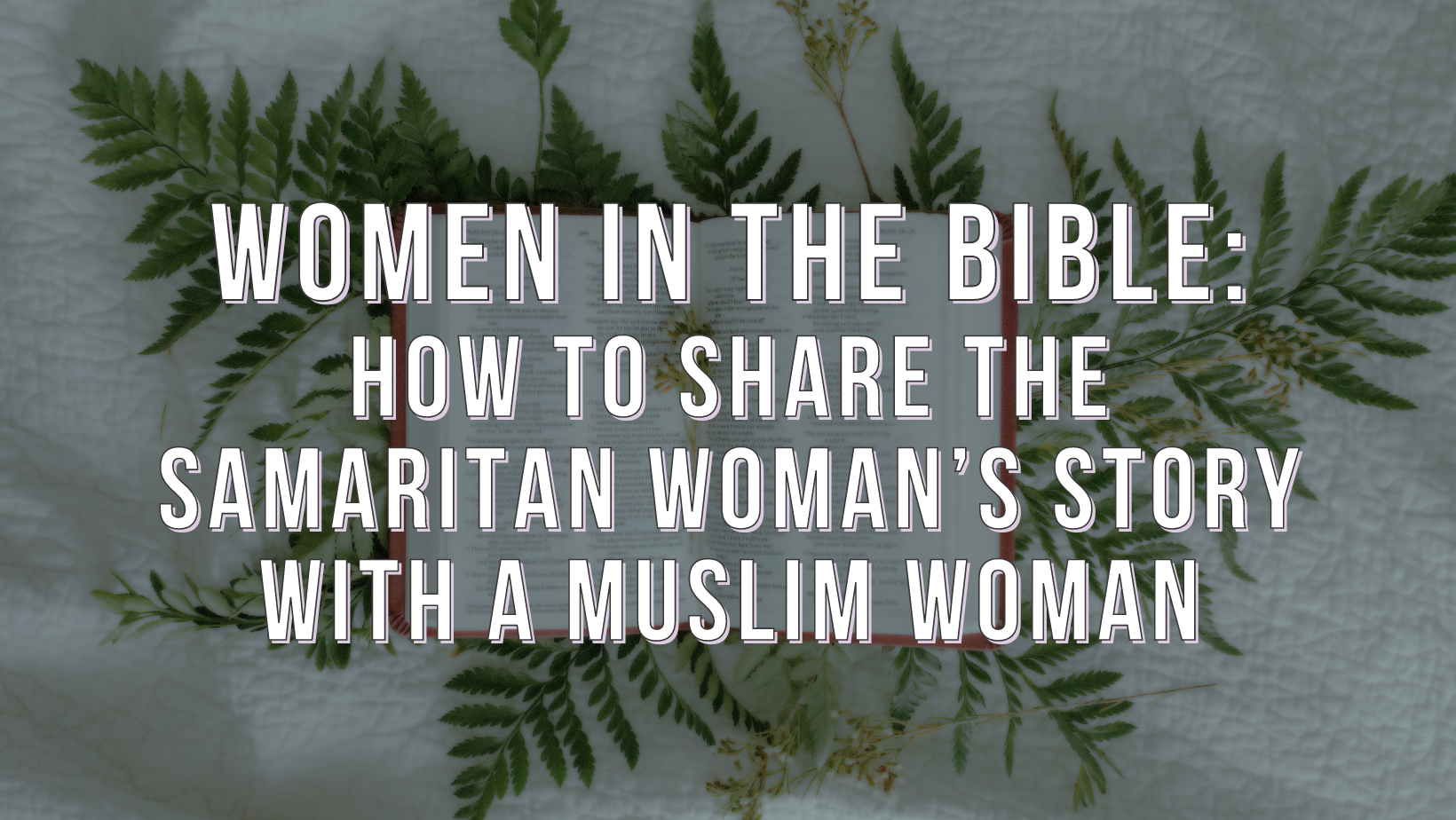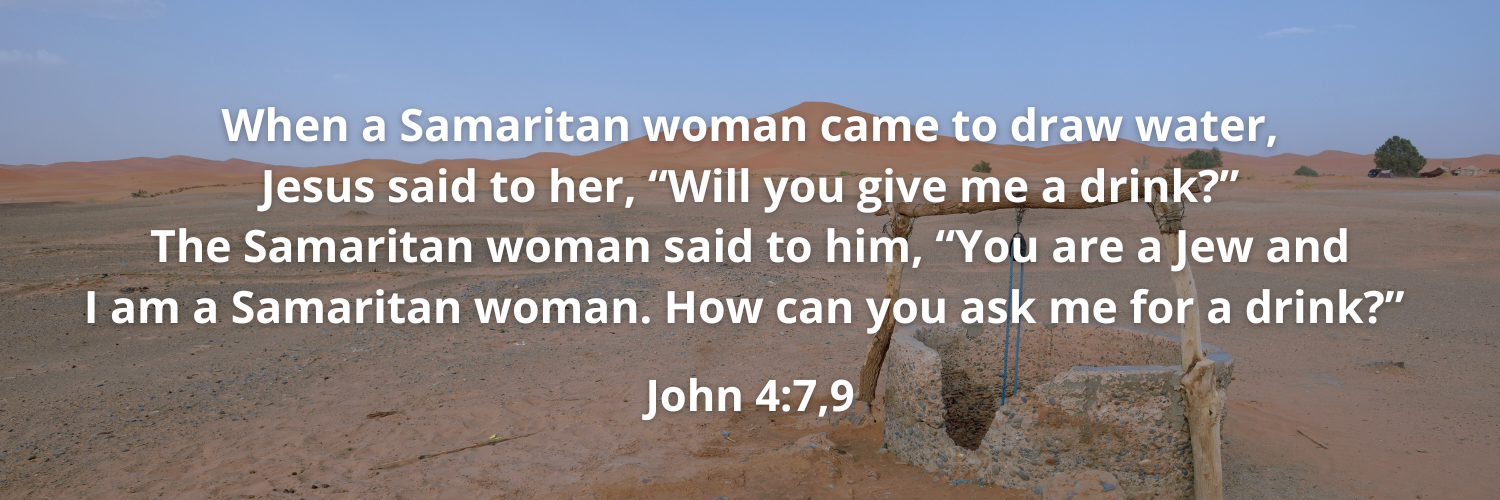Women in the Bible: How to share the Samaritan woman’s story with a Muslim woman

God created everyone equally, regardless of race, status, or gender. Sadly, because of the broken sinful world we live in, it has been a constant theme throughout the earth’s history that various segments of people are treated as less than others.
In many societies, women are not treated equal to men. This truly applies in most Islamic countries, not because of tradition but because of Islam’s core teaching about women. Here’s an example of just a few:
- Women are considered half as valuable as a man: Two women’s testimonies are equal to one man’s and a daughter receives an inheritance that is equal to half of that of her brothers.
- Women must have a male guardian in all stages of her life even if he is younger than her, like a teen-age son to a mother.
- Women must accept to share their husband with up to three other women in marriage
- A woman must take responsibility to guard the honor of the family by not behaving in a way to bring shame on them.
Traditionally, Muslim women are not raised with strong female role models, because Islam does not want them to aspire for something more than the life it offers them. However, many Muslim women in the West have been embracing the model of a woman who is equal to the man but may mix it in with her Islamic beliefs.
Your Muslim friend has been lied to, being taught that Islam elevates and respects women when this is not the case. They may even have been told that Christians are the ones who have failed their women.
You can learn more details about Islam’s treatment of women here. Right now we want to focus on how we can share the beautiful way God loves His daughters with our Muslim friends, because they have never been introduced to a God who respects and loves women.
How can you show your Muslim friend God’s love for His daughters? There is no better way to do this than to show them the way He has included women in the narrative of the Bible, when others at the time would have preferred they be completely excluded from the story.
We are going to make this a series of posts, because it is impossible to summarize all of these wonderful stories in one blog post! The first story we want to dive into, is that of Jesus and the Samaritan woman and how you can share it with your Muslim friend.
Jesus and the Samaritan woman at the well
One of the things we often hear Muslims say to our team is, “You Christians are so lucky because Christ came for you” or “Jesus only came for the Christians, He did not come to save me.”
People also thought this about Jesus during His earthly ministry, believing that He came to only save the Jews. But Jesus’ interaction with the Samaritan woman at the well tells us otherwise in John 4.
The conversation between Jesus and the Samaritan woman is long and detailed but there are a few key points we want to highlight:
- Verse 9: “The Samaritan woman said to him, “You are a Jew and I am a Samaritan woman. How can you ask me for a drink?” (For Jews do not associate with Samaritans.)”
- Verse 25-26: “The woman said, “I know that Messiah” (called Christ) “is coming. When he comes, he will explain everything to us.” Then Jesus declared, “I, the one speaking to you—I am he.”
- Verse 39: “Many of the Samaritans from that town believed in Him because of the woman’s testimony, ‘He told me everything I ever did.’”
Starting with verse 9, there was a longstanding feud between the Jews and Samaritans, so it was unheard of for them to converse with each other– That’s why Jesus’ disciples were shocked to come back and see Jesus talking to a Samaritan woman. It is clear that Jesus does not look down on her for being a Samaritan or a woman, but actually engages her in a personal and theological conversation.
In verses 25-26, Jesus makes a bold statement of His identity, revealing that He is the Messiah. In other gospels, we learn that Jesus is selective with who hears this truth; in Matthew 16:20 He even tells His disciples not to tell anyone that He is the Messiah. The fact that He admits it to the Samaritan woman is a big deal.
Verse 39 shows us that this Samaritan woman is one of the earliest evangelists sharing the Good News with her people! Jesus did not do this by accident, but instead made two big claims at once: He came to save everyone, and women are an equal part of this mission– receiving it and sharing it with others.
How to talk about this story with your Muslim friend
In the same way the Samaritan woman felt outside of the gift of Jesus coming to earth, your Muslim friend can also feel excluded from this.
Sharing this story with a Muslim woman can give her wonderful insight into how Jesus views her. She might feel the same way the Samaritan woman did– that Jesus did not come for her, and Jesus does not care about her. She might feel sinful and unclean, with an ugly past or present. She might be yearning to feel loved and accepted.
We know that Jesus can restore our friend’s life so we want to assure her that Jesus is here for her just as He was for the Samaritan woman at the well. Here are some questions you can ask your Muslim friend to open up a conversation before you share the story:
- Did you know that Jesus had theological discussions with women and allowed them to be His students?
- Do you ever feel like Jesus only cares about Christians?
- Have you ever heard about the story of Jesus talking to the Samaritan woman, who was part of a group that the Jews were supposed to hate?
While you read the story with your Muslim friend, make sure to explain difficult words, give background context, and pause at places to encourage your Muslim friend to understand what you're reading. After you finish reading this story, take a moment to absorb the story.
Open your heart and ears to truly listen to your friend's heart and words. This way you will find out which part of the story impacted them most and you can start from there to share Jesus with her. Listen more than you talk. You can schedule more times to read stories about Jesus and His wonderful works and teachings.
Be courageous and take the first step to engage your Muslim friend in conversations about Jesus. He came to free us all from the brokenness of the world, and that includes Muslim women who are rarely valued by their people and never valued by their Allah.

